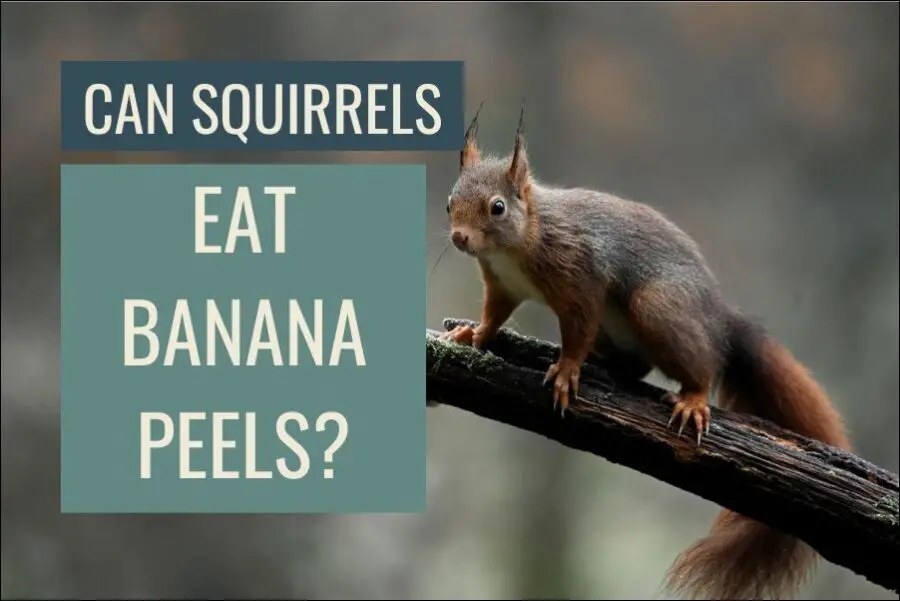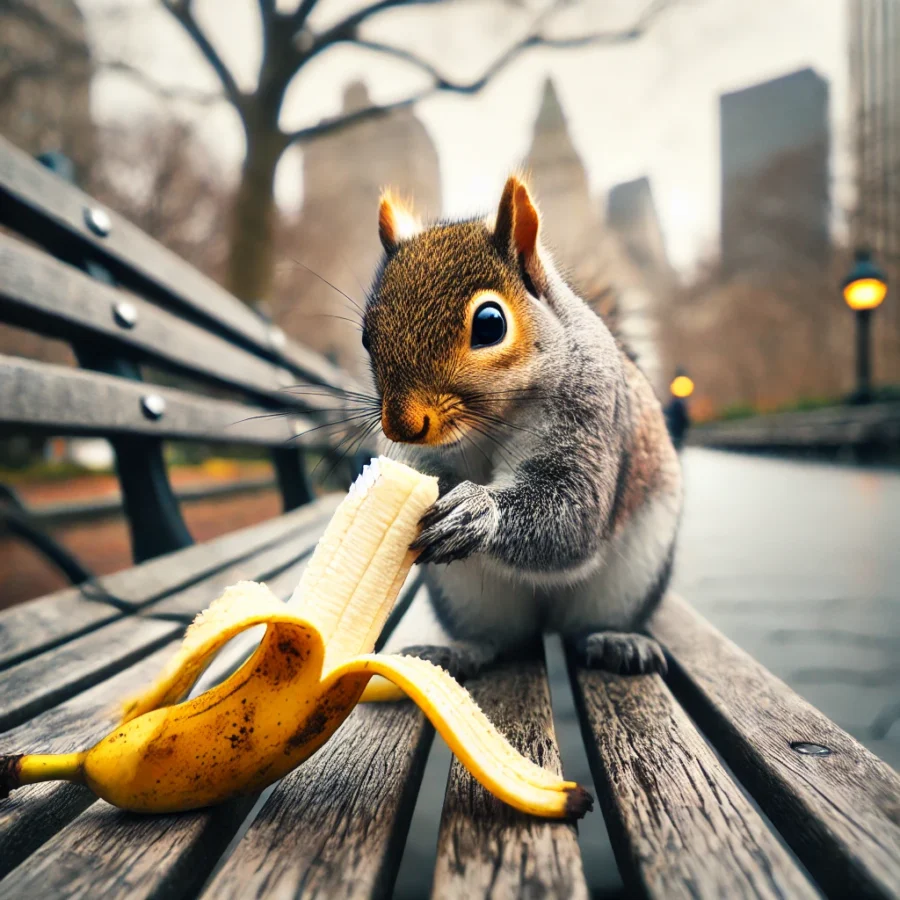
It’s a chilly morning in the park. You watch a grey squirrel sniff around a discarded banana peel. It pokes it with its nose, flips it over with its paws, and takes a cautious nibble. You might be wondering—should you be worried?
👉 No, squirrels should not eat banana peels. While not technically toxic, banana peels are difficult to digest and can lead to gastrointestinal problems or even internal blockages. They also often carry pesticide residue and provide little nutritional value.
Why do squirrels go near banana peels?
Squirrels rely heavily on smell to find food. A banana peel, with its sweet scent, might trick a hungry squirrel into thinking it’s something edible. Urban squirrels especially are known for experimenting with human food waste, including bread crusts, sandwich wrappers, and yes—banana peels.
However, unlike soft fruit or seeds, banana peels are leathery, bitter, and full of fiber. Most squirrels will lose interest after a few nibbles, but not always. And just one wrong bite can cause real issues.
If you’re used to seeing squirrels act a bit strangely, you might want to Why Are Squirrels Constantly Scratching?, which explores how food and environment affect squirrel health and behavior.
What’s inside a banana peel—and why it’s a problem
Banana peels contain:
- Large amounts of cellulose, which squirrels can’t digest well
- Tannins, which can irritate the stomach
- Possible pesticide residue from conventional farming
- A bitter taste that can discourage—but not always stop—wildlife
Squirrels don’t have the gut bacteria or chewing mechanics to break down tough skins. Even if they manage to swallow a piece, it may stay in their system longer than ideal, leading to bloating or discomfort.
Can banana peels make squirrels sick?

Yes. While not deadly in small amounts, banana peels can cause several health problems, including:
- Stomach upset
- Gas or bloating
- Diarrhea
- Choking or intestinal blockage (especially in smaller squirrels)
If a squirrel eats a particularly large or stringy piece, or if it’s dehydrated, the risk of obstruction increases. These kinds of issues are rarely witnessed in the wild unless you’re observing squirrels closely in your yard. But for wildlife rehabbers, banana peels are an absolute no-go.
What if the squirrel is just playing with the peel?
Sometimes they are. Squirrels are naturally curious and often “test” objects with their mouths or paws. You might see them:
- Dragging the peel
- Tearing small pieces off
- Licking the inside (where fruit remnants stick)
- Trying to stash it, then changing their mind
However, even this behavior can be risky. The scent can attract other squirrels, leading to aggressive competition. You can learn more about how food triggers squirrel fights in the article Why Are Squirrels Always Chasing Each Other?, which explains dominance behavior in food-scarce environments.
Can baby squirrels eat banana peels?
No—absolutely not. Baby squirrels (kits) have extremely sensitive digestive systems. They should only be fed specialized milk formula, and eventually soft, peeled fruits in tiny amounts.
Giving banana peel to a baby squirrel is extremely dangerous. It can cause choking, severe bloating, and even death. If you ever find a baby squirrel and are unsure what to feed it, make sure to read How To Help A Newborn Squirrel for safe, vet-approved guidance.
Are banana peels toxic to squirrels?
Not in the traditional sense. They don’t contain known poisons or toxins that directly kill. However, many banana peels have been treated with:
- Fungicides
- Preservatives for shelf life
- Pesticides and waxes to make them shiny
These chemical residues accumulate in the skin of the fruit. While small amounts may not harm a human, a tiny squirrel is much more vulnerable to chemical exposure.
Do squirrels even like banana peels?
Most don’t. The texture is rubbery, the taste is bitter, and the chewiness is off-putting. But hungry or urban-dwelling squirrels might still eat them out of desperation, boredom, or confusion—especially if bits of actual banana fruit are still clinging to the peel.
Want to give a squirrel a banana? Offer a tiny peeled slice instead. And if you do, make sure to do it only as a rare treat.
What fruits can squirrels eat safely?
Squirrels love sweet things, but fruit should only be a minor part of their diet. High sugar levels can lead to obesity, dental issues, and metabolic stress. Some safe fruits in small amounts include:
- Bananas (peeled)
- Apples (no seeds)
- Pears
- Grapes
- Berries
For a complete list of what squirrels can and can’t eat, including fruits, veggies, and nuts, What Fruits Can and Can’t Squirrels Eat? (20+ Examples), which breaks it down clearly with examples.
What should squirrels eat instead of banana peels?
In the wild, squirrels thrive on:
- Acorns and other nuts
- Seeds
- Tree bark and buds
- Fungi
- Insects
- Fresh greens
If you feed squirrels in your yard, better choices include:
- Unsalted pumpkin seeds
- Sunflower seeds
- Hazelnuts or walnuts in the shell
- Small pieces of carrots or green beans
- A thin slice of banana, apple, or pear (no peel)
And if you’re wondering how to adjust their food throughout the year, especially during seasonal changes, be sure to What To Feed Squirrels In The Wild? (Complete Guide), which includes seasonal tips.
Should you ever leave banana peels outdoors?
No. Even though banana peels are biodegradable, they still pose multiple risks:
- Wildlife hazard (squirrels, birds, raccoons, and foxes may eat them)
- Pesticide exposure
- Slow decomposition, especially in dry or cool weather
- Visual litter—they look like trash
- Potential road hazards, especially if thrown from cars
Leaving food waste behind in nature, even something organic, can harm animals and alter ecosystems.
How long does a banana peel take to decompose?
In warm, moist compost systems: 2 to 3 weeks
In a dry, shady forest floor: up to 2 years
During this time, it can mold, rot, and attract unwanted animals. In some cases, spoiled peels even contain botulinum toxin, which is deadly to small mammals.
What if you already gave a squirrel banana peel?
Don’t panic. A small nibble likely won’t cause lasting harm. But keep an eye out if it’s a backyard squirrel you regularly see. Warning signs of illness include:
- Lethargy
- Lack of appetite
- Loose stools
- Swollen abdomen
- Labored breathing
If you’re ever in doubt, refer to emergency squirrel care resources like the one described in the article What To Do If You Find An Injured Squirrel (Step By Step).
How else can you help squirrels?
Offering food is a kind gesture, but there’s much more you can do to help squirrels safely and sustainably:
- Provide fresh water—especially in summer and winter
- Plant native trees like oak, hazel, and beech
- Avoid pesticide use in your yard
- Leave leaf litter and branches for nesting
- Install squirrel feeders or boxes for shelter
If you want to get ready for the colder months, you might enjoy the article How To Help Squirrels Prepare For Winter, which gives step-by-step tips on shelter, hydration, and safe feeding.
Summary
Banana peels aren’t deadly, but they’re definitely not safe for squirrels.
- Too tough to digest
- Often contaminated
- May cause blockages or illness
- Attract the wrong kind of attention in nature
If you want to treat a squirrel, go for a small slice of banana without the peel—and always clean up afterward.
